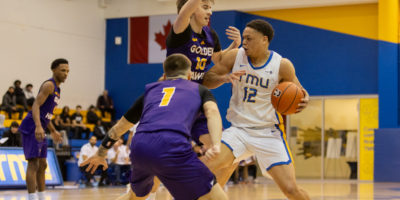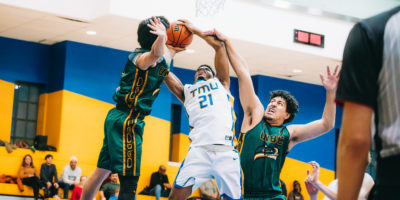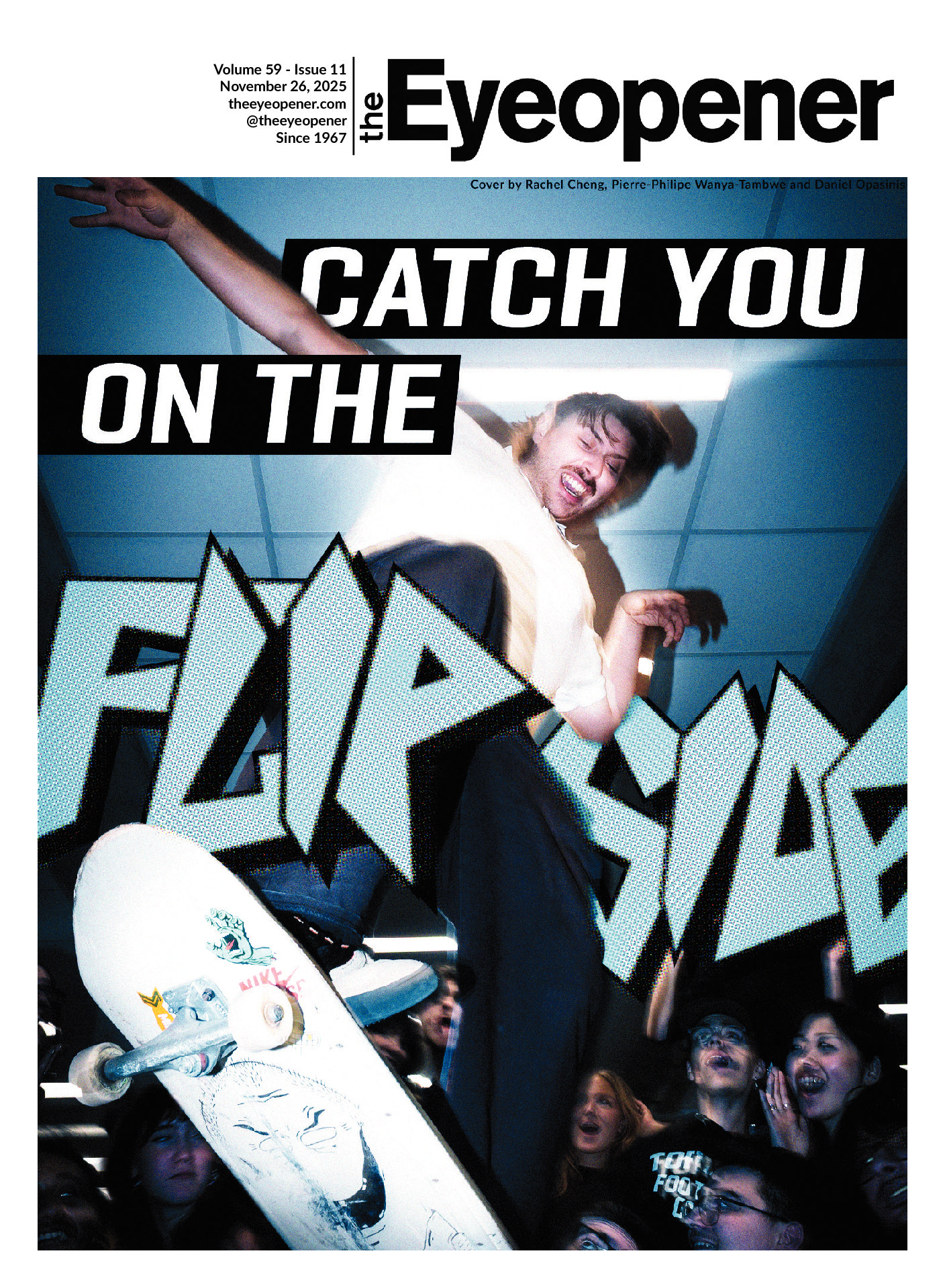The Muslim Students’ Association is the largest group on campus with 1,200 members, the most politically active, with a former president heading the Ryerson Students’ Union, and the most vocal, bringing the issue of Islamophobia to the forefront. But is the group’s size and strength coming at the expense of smaller student groups? Sarah Boesveld reports.
As the largest student group on campus, the Muslim Students’ Association has made its presence known in student politics. Former MSA vice-president Muhammad Ali Jabbar is heading up the RSU, thanks to support from the MSA. The group has monopolized use of the multifaith room, putting the true meaning of the room’s name in jeopardy.
Through its renewed fight against Islamophobia, the MSA has also been criticized as being increasingly polarized and turning the RSU’s attention mostly toward Muslim issues. Smaller religious groups with less influence have been left wondering when their needs will be addressed.
A variety of religious groups on campus have said they have felt uncomfortable trying to use the multifaith room.
Eric Da Silva, president of the Catholic Student Association, says the group looked into using the room for mass but was told by RSU front desk staff that the room was “permanently booked” by Muslim students.
“No one is trying to take away the space from the Muslims, we just don’t want to be stepping on their toes,” says Da Silva. He stresses that the group found another space to hold mass and the conflict was quickly resolved. Da Silva acknowledges that Muslims have a stricter prayer schedule than Catholics, but he challenges whether the room should be called a multifaith one. The space, which is divided to separate males from females, has rows taped on the floor for prayer and Islamic decorations adorning the walls, is only accommodating to Muslims.
“I don’t think the university should be calling it a multifaith room. If we went in there and decorated the room with rosary and crosses, other students would feel uncomfortable praying there,” he says.
The Ismaili Student’s Association, a smaller Muslim student group that practices the Shiite Muslim religion, has experienced conflicting schedules with the MSA for prayer space during the month of Ramadan. On a regular basis, the smaller group uses the multi-faith room for prayer between 6 and 7 p.m. During Ramadan, when Muslims break their fast at sunset, the Ismaili students, who practice a separate form of prayer were resigned to finding somewhere else to pray.
“We were pretty much in a different room every night for a month,” says a member of the group who wished not to be named. “It can be frustrating at times, but you kind of have to make the best of the situation,” she says of having to move so the MSA can use the room.
At the semi-annual general meeting last week, RSU passed a motion to create a multifaith council in which representatives from all religious groups will come together to “learn from each other” and create “harmony on campus,” Jabbar says. A Canadian Federation of Students task force tackling cultural and religious discrimination was brought to campus by members of the MSA on Nov. 1, but it only addressed the problem of Islamophobia. Anti-Semitism and racism towards other minorities were not discussed.
When Ryerson campus was slammed with death threats and anti-Muslim propaganda two years ago, the MSA stepped up to the plate, denouncing these acts and doing their part to eradicate Islamophobia.
“There was a lot of stuff on anti-Semitism then,” says Jabbar. “There was nothing addressing Islamophobia on campus.”
Jonathan Vandersluis, president of Hillel, a Ryerson Jewish group, has concerns that the MSA is using its power to pay attention only to issues facing them, especially pertaining to the recent task force.
“It came out of a campaign that was saying no to racism, Islamophobia, and anti-semitism. How come we’re only addressing the needs of Muslims?” he asks. Vandersluis says Hillel did not get involved in the taskforce because they weren’t informed about it at the time.
Getting involved is something the MSA has prided itself on. Jabbar is grateful for the MSA endorsement and high voter turnout for his election victory last spring.
“I’m not going to deny it,” says Jabbar. “The support I got from the MSA, I really appreciated.”
“When something positive happens, it rejuvinates our community,” he says of his election win and the support he gathered. Sarah Turnbull, who ran against Jabbar for RSU president last year, was surprised that the MSA’s endorsement of Jabbar went as far as it did.
“I had my Muslim friends told not to vote for me because if they didn’t vote for Jabbar, the Muslims would be suppressed,” she says. “In the end some of my strongest supporters were Muslims and they were more horrified by this then even I was.”
Turnbull also says that the MSA is what led to the “United” slate to choose Jabbar for president. “It was clearly Nora Loreto’s turn (to run for president),” she says of the experienced and vocal RSU politico.
Jabbar says Loreto’s decision to run for vice president education was her decision alone.
“That’s what she holds true to her heart,” he says, adding that the current slate discussed who would be best in each RSU position. Jabbar says that everyone is doing what they want to do and are working toward representing the student body as a whole, not just Muslims.
As in most democracies, there are some who feel they are not being represented by the government. There are Muslim students on campus who feel their views are not represented well by the student union.
RSU has put too much emphasis on Muslim issues at the cost of representing the needs of all student groups, says a Muslim Ryerson Business student who asked not to be named out of fear of retribution
“Everything they’re doing is Muslim, Muslim, Muslim. Whenever I hear them at their meetings that’s the rhetoric they’re using,” he says.
The 1,200 student membership of the MSA is responsible for its strong voice in the RSU, not Jabbar’s presidency says MSA president Waleed Elsayed.
“It was the same when Rebecca Rose was in (the RSU president’s) office. She heard our concerns and so does Muhammad Ali Jabbar. Whoever the next president is, because we have an all inclusive campus, will hear our concerns too,” says Elsayed.
He says that the multifaith room is used most often by the MSA because of their great numbers and their prayer schedule which demands prayers five times a day.
“In the future we may very well need another room just for Muslim students,” he says if other groups wish to use the room more often.
Elsayed says the political involvement of the MSA has not been intentionally influential.
“We want to be a part of the university. Politically, there’s nothing that we want, we have our prayer space in the new building.”
At other schools across Canada, Muslim students are still struggling to find a space of their own. Thomas Butko, professor at University of Alberta and expert on politics and Islam says the issue of prayer space at his university campus is exactly the opposite of Ryerson’s.
“On the most part, a lot of these multifaith areas have been dominated by Christians,” he says, adding that at U of A, Muslims are a minority who don’t want to “rock the boat.”
As the largest religious group on Ryerson’s campus, Butko is not surprised that the MSA is dipping its hand into politics.
“It makes common sense that larger numbers would try to be more promoters of their interests,” he says.
Butko says that because religion is seen as private, a large group going public with their interests can be interpreted as controversial.
“People tend to be all or nothing about religion,” he says. It was only 20 years ago that the Lord’s prayer could be heard in public elementary school classrooms across Canada.
“Many Christians still don’t see this as a mixing of public and private,” he says.
At smaller campuses like University of New Brunswick, the MSA has little to no political influence in student government. After three years there are 70 members and have only recently gained prayer space.
“We don’t have plans to be represented in the student union,” says MSA president Yahya Abuamer. “We don’t propogate our religions, we’re just showing education to erase misconceptions about our faith.”
El-Tantawy Attia, executive director of Masjid Toronto says it’s important for Muslims to be involved in student politics.
“You should not penalize an active group if the others are not.”
Attia commends Ryerson’s MSA for its great work in helping the needy during Ramadan.
Its strong numbers allows the group to make positive contributions to the Ryerson community, such as a $7,000 donation to the Community Food Room with funds raised from a fast-a-thon.










Leave a Reply